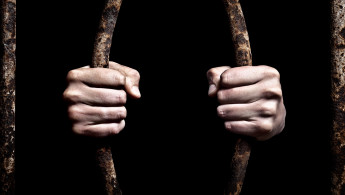Inside the gulags of the Islamic State group
Voices are raised and confusion spreads through al-Dawwasa market in Mosul, northern Iraq. A man ordered to get in a car by two fighters pleads and utters a few incomprehensible words. The armed men warn him of the consequences of disobedience and he is bundled in. Tyres screech as they drive off.
With pain and bruising all over his body, Ismail al-Jubouri believes he is lucky to be alive, among family and friends and able to tell al-Araby al-Jadeed of his harrowing experience of imprisonment, interrogation and torture at the hands of the Islamic State group.
| Most people in IS prisons are held for the "crime" of not pledging allegiance to the IS. |
Speaking from Kirkuk, where he fled after his release, Jabouri says he was first taken to a large house "furnished to the highest standards... I was left there for more than two days, before I was interrogated while blindfolded by a man who sounded like he was young."
Jubouri had been searching for his brother, a police officer, since the group overran Mosul in June. It seemed that the IS were also keen to find him.
Jubouri said all the questions were about his brother's whereabouts, and that they promised to release him if he cooperated. He added that he thought he was going to be executed on the third day when he was led outside the house, but instead he was transferred to a central prison for more interrogation and a final decision about his fate.
When his blindfold was removed, Jubouri realised he was in a prison in the Ghabaat area of Mosul, which IS fighters use to hold their "high-level" prisoners.
It was here that Jubouri was flogged and suffered electric shocks and false executions. But "all the torture tactics in jail did not get them anywhere", he said, as he did not know his brother's location.
"I repeatedly told them that my last call with my brother was three days before the fall of Mosul, which they verified by checking my phone history, which they used as investigative evidence," he said.
Banged up
Inside the IS central prison in Mosul, Jubouri met doctors, civil servants, imams, army officers, politicians, tribal leaders and fighters from other factions. All were held on the charge of not pledging allegiance to the IS, the "crime" for which most people are held in IS prisons.
Jubouri spent two weeks locked up there, two weeks he considers the worst in his life. He has endeavoured to document his prison experiences at the request of his friend, Satea al-Nuaimi, a former lecturer at the University of Mosul, who is writing a book on life in Mosul under the IS. Nuaimi is dedicating a chapter of his book to the IS security and judicial apparatus.
The mobile division
Nuaimi revealed that, before the US-led airstrikes on Mosul, IS police and prisons were based in Christian neighbourhoods, whose inhabitants had been forced out or executed as apostates. These prisons were used for initial interrogations, after which a person would be transferred to one of the main prisons in the city - either the juvenile prison in the city centre, where people accused of theft, fornication, intoxication and other less serious charges would be held, or the notorious high-security Ghabaat prison.
There is also a women's police station, which deals with female prisoners.
| Fallujah has five prisons holding opponents of the IS, tribesmen, security offers and clerics who refused to pledge allegiance to the organisation. |
The most secretive aspect of IS penitentiaries are the mobile prison, Nuaimi said, where prisoners were constantly on the move to avoid airstrikes.
The mobile prison contains high value prisoners including high-ranking military officers, government officials and foreign hostages, who are moved between Iraq and Syria.
After the intensification of airstrikes on buildings occupied by IS, it is believed that the group moved the majority of its important prisoners to secret locations, possibly to the impoverished Souk al-Shaarin and al-Sarchkhanah areas of Mosul.
Further afield
In the Nineveh province, south of the city, IS uses Badush prison, the second largest in Iraq, and which was under US control between 2003 and 2008. The prison has the capacity to house 3,500 prisoners, and Nineveh council deputy head Nour al-Din Qabalan said there were at least 1,250 there now.
Yusuf Dhanoun, a former member of the Nineveh police who managed to survive a similar oredeal to Jabouri's, told al-Araby he was arrested by IS fighters for not paying the fine of 500,000 dinars ($400) the organisation had imposed on members of the security forces.
"I was moved to a detention centre and interrogated by a person with a Tunisian accent," he said. "I was then moved to a detention centre at the former police headquarters in the Bab al-Toub area, and after three days I was transferred to the IS high court where a judge sentenced me to 30 lashes, which were carried out in a public square.
"After that, I was released when my family paid the full fine, and after they confiscated my police-issued weapon."
Under siege
The city of Fallujah contains five prisons that hold opponents of the IS - tribesmen, security offers and clerics who refused to pledge allegiance, according to activist Omar al-Dulaimi. All five prisons are believed to be under the control of a Chinese IS commander named "Abu Asia". One is located in the industrial area, while the other four are in government buildings in the city centre, Dulaimi said.
"In Fallujah, the organisation has a Sharia court with three judges, one of whom is a Syrian national," said Dulaimi. "The court specialises in cases of people working for, or part of, the Iraqi government, and cases of opposition to the IS and not pledging allegiance to the organisation."
This is an edited translation from our Arabic edition.



